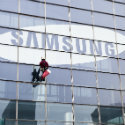
Spark New Zealand has rewarded Samsung with a 5G RAN contract following successful trials of the supplier's kit at Spark Lab, which puts next-gen technologies through their paces.
The vote of confidence is not entirely a surprise. In November 2019, Spark, New Zealand's largest operator, paraded the South Korean vendor alongside Nokia – which appears to be spearheading Spark's initial 5G rollouts – as part of its trio of preferred 5G RAN suppliers.
The third vendor on the list will surely raise some eyebrows, however: It's none other than Huawei.
Back in 2018 the New Zealand government, under intense pressure from the US, warned Spark not to use 5G equipment from Chinese suppliers over alleged fears they might pose a risk to national security.
New Zealand's government, along with Australia's, made no distinction in the scope for cybersecurity shenanigans between the RAN and core. In keeping with US advice from security advisers and President Donald Trump, both countries advocated a blanket ban on any 5G equipment whatsoever from Huawei and smaller Chinese rival ZTE.
What then to make of Huawei's inclusion on Spark's roster of preferred 5G RAN equipment suppliers? It seems little more than a forlorn protest as far as Light Reading can make out – the operator's nose was undoubtedly put out of joint by not having access to some pretty decent and price competitive kit – but that will not worry Samsung one jot.
With Huawei effectively sidelined in New Zealand, the South Korean vendor appears to be making some 5G hay. According to its press release, Samsung will supply Spark with its latest 5G New Radio (NR) solutions, which include "lightweight" massive MIMO radios.
There might also be an opportunity for Samsung to go deeper into Spark's network. Trials at Spark Lab apparently used the supplier's 5G "end-to-end solutions" to test and verify potential of the next-gen tech.
Spark, though, seems to have the 5G core covered. When it paraded its list of preferred 5G suppliers in November 2019, the operator pretty much said that Cisco Systems and Ericsson were first picks for separate elements of its existing network core, which has already been upgraded to support non-standalone 5G NR.
For more on this topic, see:
— Ken Wieland, contributing editor, special to Light Reading
Read more about:
AsiaAbout the Author(s)
You May Also Like












